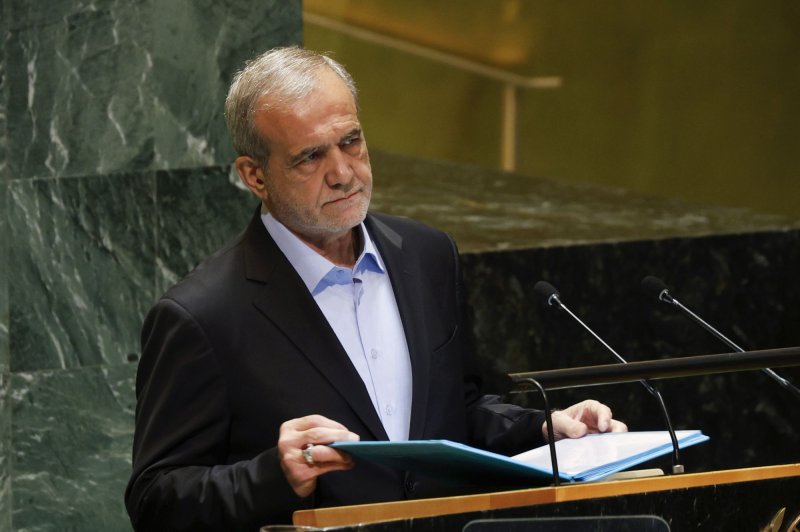Islamic Republic of Iran President Masoud Pezeshkian speaks at the UN General Assembly 79th session General Debate at the United Nations in September 2024. File Photo by John Angelillo/UPI |
License PhotoMarch 30 (UPI) — Iranian President Masoud Pezeshkian reiterated Sunday that his country had rejected holding direct talks with the Trump administration over its nuclear program but is willing to begin indirect talks.
Pezeshkian delivered the remarks, published by his office, in a cabinet meeting speech in response to a letter sent by President Donald Trump, received through Oman. Iranian state media, which confirmed the news, said Trump sent the letter through an Emirati emissary on March 12.
“Although the issue of direct negotiations between the two sides was rejected, it was stated that the path of indirect negotiations is open,” Pezeshkian said.
Pezeshkian said Iran has “never avoided negotiations” over its nuclear program and said it was the “behavior of the Americans” that would determine the path of nuclear talks.
The contents of the letter have not been made public, though Trump told Fox News that he told Iran it cannot have a nuclear weapon and that the United States was willing to go use its military to prevent that if Iran refused to negotiate.
The fact that Iran had responded was first reported Friday with Kamal Kharazi, the top foreign policy adviser to Supreme Leader Ayatollah Ali Khamenei, making similar remarks expressing openness to indirect talks.
The alignment between Pezeshkian and Kharazi marks a rare moment of consensus between Iran’s elected government and its unelected religious leadership on foreign policy. Their shared openness to indirect nuclear talks signals a coordinated shift in Tehran’s approach, potentially paving the way for renewed diplomacy between Iran and the West.
The United States opposes Iran obtaining nuclear weapons due to concerns about regional instability, the potential for a nuclear arms race in the Middle East, and threats to allies like Israel. U.S. officials also worry Iran could provide nuclear technology to non-state actors.
Iran argues that as a sovereign nation it has the right to develop nuclear capabilities for defense and energy under the Nuclear Non-Proliferation Treaty, and some advocates say that nuclear deterrence could stabilize power dynamics in the region, much like it has among other nuclear-armed states.
